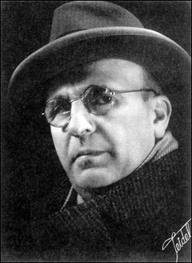Kurt Gänzl
The Encyclopedia of the Musical Theatre
23 June, 2016
Giuditta was the last of the series of darkly coloured romantic operettas (this one purposely titled ‘musikalische Komödie’) composed by Lehár in the late 1920s and early 1930s and created by the star tenor, Richard Tauber. It made its first appearance on 20 January 1934, after some shocked in-house resistance from those who felt an operetta unsuitable for Vienna’s famous opera theatre, on the stage of the Staatsoper, where Tauber was counted on as an enormous box-office draw. (Actually, triple ticket prices were charged on opening night: it was sold out.)

Franz Lehár with his star tenor Richard Tauber who premiered all of Lehár’s last operettas.
Tauber played Octavio, an army Captain who ultimately abandons his career and his well-being for the charms of the tempestuous wife of a Mediterranean artisan, and Lehár supplied him with a violently high-pitched and showy entrance (“Freunde, das Leben ist lebenswert”) and some passionate arias (“Schönste der Frau’n”, “Du bist meine Sonne”) to follow.
However, the bon-bons of the score of Giuditta fell to the vamping lady of the title-rôle, created by soprano Jarmila Novotna.

Soprano Jarmila Novotna in 1935.
In the first scene she describes her frustrated longing to sink “In einem Meer von Liebe”, in the third she weeps out her passionate frenzy at failing to make Octavio desert the army to stay with her (“In die Stirne fällt die Locke”) and in the fourth, now a night-club performer with rich men in her bed, she hymns her own sexuality in the popular waltz song “Meine Lippen sie küssen so heiss”.
There was some light relief to the dark main story in the parallel affair of the fruit-seller Pierrino (Erich Zimmermann) and his girlfriend Anita (Margit Bokor), and some greener comedy in the nightclub sequences, but basically Giuditta was an operetta of dreadful and destructive passions, set with some of the darkest and most thickly orchestrated of Lehár’s music.
The original production, directed by Hubert Marischka, got mixed reviews and played 42 times during the season in which it was introduced into the general repertoire. In 1938, after only a few more performances had been played, came the “Anschluss” – Tauber left town, as did Novotna, and Giuditta was played no more in Vienna. Librettist Fritz Löhner-Beda was taken away to a concentration camp and died in Auschwitz.

Star librettist Fritz Löhner-Beda.
Giuditta received little attention overseas. It was produced in Budapest shortly after its introduction in Vienna, and the Théâtre de la Monnaie, Brussels, staged a production (ad André Mauprey) the following season with Kate Walter-Lippert and José Janson in the leading rôles. Janson also featured in the first French performance, at Toulouse in 1936, opposite Mme Chauny-Lasson, but Giuditta, in spite of a handful of provincial productions, did not play Paris, nor London, nor New York. However, the piece got a late English-language and American première at the Ohio Light Opera in 1994. It was subsequently also recorded in English by conductor Richard Bonynge. In 1970 a German television version was made with Rudolf Schock and Teresa Stratas featured.

The English language recording of “Giuditta” conducted by Richard Bonynge, starring Jerry Hadley and Deborah Riedel.
In spite of its poor track record, however, the piece survives. It has subsequently been given various major recordings, its principal numbers have been frequently performed by vocalists attempting cross-overs between opera and operetta and, in an age which prizes the heaviest and most sentimental/dramatic end of the repertoire, it has received several stage productions, notably at the Vienna Volksoper in 1993 and at the Staatsoperette Dresden in 2013.

Sheet music cover for Lehár’s “Giuditta.”
However, it has never become popular in the way that Lehár’s lighter works or Das Land des Lächelns, the most successful of his romantic pieces, have done.
Hungary: Magyar Királyi Operaház 8 April 1934; France: Théâtre du Capitole, Toulouse March 1936; USA: Ohio Light Opera 1994; TV-film: 1970

I am an operetta lover myself too and I adore performances with nice songs and when the productions are including quality artists then the outcome is marvelous!. The greek national opera hosts opera and operetta performances like that, and most of the time you can find amazing productions! this is their site https://www.nationalopera.gr/en/ in case you wanna visit Greece one day, attending one of their shows is a must!